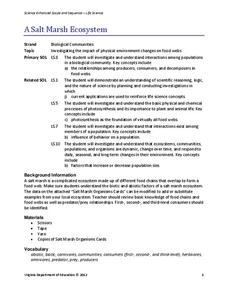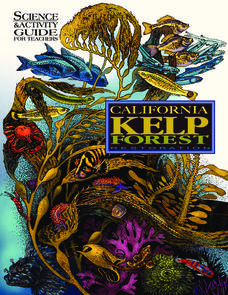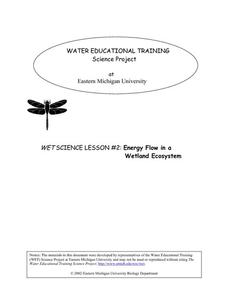Science Matters
Matter Cycles — Sum It Up
Scholars become part of the cycle of matter with a reader's theater that showcases producers, consumers, decomposers, and the sun. A diagram and discussion concludes the learning experience and enhances comprehension.
NOAA
Sustaining Our Ocean Resources
Lead young scientists on an investigation of fishery practices with the final installment of this four-part unit. Using a PowerPoint presentation and hands-on simulation, this activity engages children in learning how fish populations...
Scholastic
Minibeasts
Lead young scientists to discover insects outdoors. After investigating, students will record observations, learn about these fascinating creatures, craft, and role play.
Curated OER
Hedgerows
Hedgerows prevent soil erosion, capture pollutants running off fields, store carbon to help combat climate change, and provide homes for predators of many pest species. The biodiversity lesson begins with an activity that discusses why...
Curated OER
Sustainability and Extinction
Galapagos Penguins are the only penguins on earth that live north of the equator (in the wild). In this last lesson plan a discussion on how the Galapagos islands developed their populations and diversity sparks the introduction. Two...
Core Knowledge Foundation
Ecology Tell It Again!™ Read-Aloud Anthology
A read-aloud anthology provides informational texts about ecology to boost reading comprehension. Third-graders listen and discuss readings where they answer questions and focus on vocabulary. Pupils complete extension activities,...
National Park Service
Living & Non-Living Interactions
What better way to learn about ecosystems than by getting outside and observing them first hand? Accompanying a field trip to a local park or outdoor space, this series of collaborative activities engages children in learning about the...
National Wildlife Federation
Habitat Web
Young scientists weave together an understanding of ecosystems with this fun collaborative activity. Taking on the roles of different living and non-living elements of specific habitats, learners use a ball of yarn to create the web of...
Virginia Department of Education
Go with the Flow
How does nature's hierarchy relate to our local human environment? Answer this question, along with others, as the class visually depicts the natural hierarchy provided by nature. Pupils discuss each piece of the pyramid and its energy...
Virginia Department of Education
A Salt Marsh Ecosystem
What a web we weave. Pupils use yarn as the primary resource to create a web depicting the intricacies of a salt marsh ecosystem. They participate in a question and answer session, which leads to an in-depth facilitated discussion about...
Dawn N . Ericson
California Kelp Forest Restoration
This unit is so cool, you won't be able to "kelp" yourself! Intended for all grades, this science and activity guide for teachers offers a unique opportunity to understand kelp's role as a valuable ecological resource. Teachers and...
EngageNY
Final Performance Task: Sharing Visual Representations of Position Papers
It's time to put down those pencils and celebrate! Scholars share the visual representations of their position papers with the class. They participate in a gallery walk to view each other's work, writing a piece of praise for their...
Eastern Michigan University
Energy Flow in a Wetland Ecosystem
How is energy transferred within an ecosystem? What would happen to a food web if one of the organisms was removed? Elementary or middle school ecologists examine these questions and more in a comprehensive 5E learning cycle lesson....
Intel
Insects: The Good, The Bad, The Ugly
What would the world be like with no insects? Ponder this question using a research-based STEM unit that encourages scholars to investigate insects from both a beneficial and hazardous perspective. They learn about insect behaviors,...
Science Matters
That’s An Otter Story
Young scientists discover how sea otters' habitats have changed due to human impact. Through conversation, video observation, and story reading, scholars identify how human interactions change a specific ecosystem in both positive and...
Cornell University
Polymers: Making Silly Putty
Putty is proof that learning can be fun! Share the wonderful world of polymers with your class through an experiment. Young scientists create their own silly putty, then examine its properties.
Forest Foundation
The Web of Life
Producers, herbivores, carnivores, omnivores, decomposers. To begin a study of the forest ecosystem, learners examine the connections among the members of ecological communities.
Curated OER
Circle of Life
Here is a well-designed science lesson plan that shows learners that everything that organisms do in ecosystems, including running, breathing, burrowing, growing, requires energy. After a thorough discussion of their own eating and...
Alliance Theater
The Jungle Book Post-Show STEAM Lesson
An ecosystem is really just the flow of energy through many different living organisms. A study of Rudyard Kipling's The Jungle Book leads to an environmental science activity in which learners study how various factors can affect...
Kenan Fellows
Microorganisms in Pond Water
That is living in the water? Groups of two to three view pond water with microscopes in order to find microorganisms. They draw pictures of the ones they find in their slides. The groups compare their drawings to pictures of common pond...
Curated OER
Peregrine Falcon
Young environmentalists study the effects that pesticides have on birds, such as the peregrine falcon. They also look at predator/prey interactions. Some wonderful in-class activities accompany an inventive instructional activity. After...
Michigan State University
Friend or Foe?
What one person thinks is a pest may not be a pest to someone else. Here, scholars examine the characteristics of living things and pests through grand conversation and a variety of activities. Class members play a game of pest or not a...
Conserve Wildlife Foundation of New Jersey
The Great Peregrine Scavenger Hunt - On the Internet
The story of one bird provides valuable insight into general animal behaviors and interactions. Young researchers investigate the peregrine falcon using a web search. They analyze the behaviors of the raptor including its migration...
Virginia Department of Education
Predator-Prey Simulation
Do your pupils have the misconception that environmental predators are "bad" and harm smaller creatures? The simulation explains, in detail, the important role predators play in maintaining a stable ecosystem. Through web-based research,...
Other popular searches
- Deciduous Forest Food Chains
- Food Chains in Biomes
- Food Chains Food Webs
- Food Chains and Webs
- Food Chains Decomposers
- Food Chains and Food Webs
- Animal Food Chains
- Ocean Food Chains
- Meadow Food Chains
- Food Chains, Food Webs
- Guided Discovery Food Chains
- Food Chains Webs

























